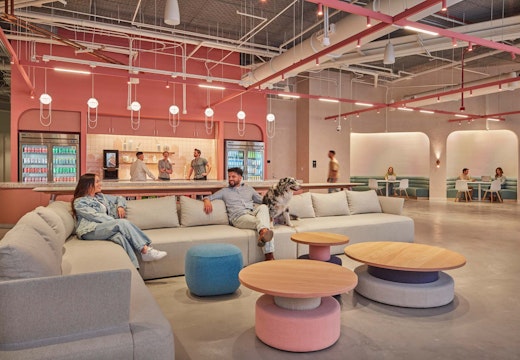How AI is reimagining the corporate real estate market
The rapid rise of AI is transforming corporate real estate, from workplace experience to portfolio optimisation, opening up new possibilities for agility and performance
The AI revolution has arrived and it’s rewriting the rules of business faster than you can say ‘machine learning.’ But here’s the million-dollar question: Is your organisation leading the dance, or stumbling to catch up?
‘If you think the AI revolution is hypothetical or hyperbole – think again,’ notes Ram Srinivasan, Managing Director and Global AI Adoption Leader with JLL Consulting Services. ‘This is an inflection point. A fundamental shift in how we work, innovate and create value. Companies that don’t adapt will be obsolete.’
JLL’s Future of Work 2024 survey revealed 90% of companies plan to harness AI in commercial real estate within the next five years. But this doesn’t mean that the future of work is about replacing humans with machines. Peter Miscovich, Executive Managing Director and Global Future of Work Leader at JLL Consulting Services explain that, ‘It’s about creating a symbiotic relationship where AI augments human creativity and decision-making. The future of AI and CRE will create new intelligent collaborative workplace ecosystems.’
The impact of AI on CRE
While 87% of executives are desperate for talent that can use AI, only 30% of employees feel they have the skills to keep up.
‘Leaders who view AI as just another IT project are missing the forest for the trees,’ says Srinivasan. ‘This is about reimagining your entire approach to talent, space, business model optimisation and value creation.’
AI impacts all areas of the CRE ecosystem, but we’ve identified three key areas in which CRE leaders should prioritise AI augmentation.
1: Employee workplace experience
Attracting and retaining top talent is the number one priority for leading organisations – and the workplace experience plays a big role here. AI empowers organisations to transform lacklustre employee experiences into seamless, friction-free ‘peak workplace experiences.’ Shifting the focus from traditional workplace experience delivery to a more AI-enabled, personalised work experience will yield greater employee satisfaction and engagement.
2: Dynamic workplace management
Workplace management has become much more dynamic and a significant opportunity for improving CRE performance and efficacy. AI-driven analytics can pinpoint inefficiencies in overall workplace operations to help better manage CRE with the optimisation of leases, energy usage, footprint and daily operations.
3: Corporate real estate transformation
Real estate leaders are under constant pressure to deliver continuous performance improvement to meet ever-changing business and market conditions. AI-enabled decisioning provides real-time actionable insights that inform agile organisations to propel CRE performance toward operational excellence.
But the investment in developing and deploying in-house AI systems and hiring talent to maintain them is high. The alternative is to collaborate with partners who understand the business and tailor the approach to individual organisational needs. ‘We are already seeing CIOs dump in-house attempts at AI projects in favour of tried and tested commercial AI’, says Srinivasan.
On the other hand, many organisations say there are still sceptics among the key stakeholders at their firms. Decision-makers among IT, legal and other C-suite execs are sometimes reluctant to bring in new AI tools. The key is to share use cases and the expected return on investment, as well as confront any concerns about data privacy. A reputable real estate consultant will partner with industry experts and innovative organisations to spin up a holistic AI strategy that transforms entire CRE ecosystems with the following processes.
Measurable impact
AI in the workplace is already delivering measurable value. In the financial services sector, global organisations are realising savings that run into the hundreds of millions through AI-powered workplace insights. In the technology sector, leaders are building comprehensive roadmaps with hundreds of high-impact use cases, reshaping the entire corporate real estate (CRE) function.
The potential extends far beyond energy optimisation or improved data visualisation. AI is enabling:
-
- Dynamic space optimisation that responds in real time to shifting work patterns.
- Predictive maintenance that reduces downtime before problems arise.
- Hyper-personalised experiences that make the workplace feel truly individual.
This matters because the workplace has become central to talent attraction and retention. HP’s 2024 Work Relationship Index underscores the demand for personalisation: 68% of knowledge workers and 76% of business leaders seek a workplace tailored to their needs. Strikingly, employees value this so highly that 87% would accept a 14% pay cut for it – rising to 19% among Gen Z.
Integrating AI into workplace strategy is not simply about operational efficiency. It is about creating environments that resonate with employees on a personal level, while driving resilience and long-term value for the organisation.
Read more about it in this guide by JLL, AI in CRE: From Sci-Fi to reality.








